News in 2018

|
FIG at the Global Land Tool Network Partners Meeting
23-27 April 2018, Nairobi, Kenya
"Land is the maker and the marker for the SDG's"
Frits van der Wal, Ministry of Foreign Affairs, Netherlands
FIG has been working with the Global Land Tool Network (GLTN)
facilitated by UN-Habitat since its very beginning in
2006. In 2018 the 7th Partners Meeting was held with a record number of
participants at the UN-Habitat premises in Nairobi, Kenya.
Today, the Global Land Tool Network consists of 77 partners. For the
term 2017-18 FIG has been in the lead of those partners that belong to the cluster
of International Professional Bodies, counting in total 14 of the 77
partners. FIG was represented by Vice President Diane Dumashie, Chair of
Young Surveyors Eva-Maria Unger and Director Louise Friis-Hansen.
Present were many connected to FIG, hereunder Honorary President Stig
Enemark, and Chair Elect of FIG Commission 2 David Mitchell.
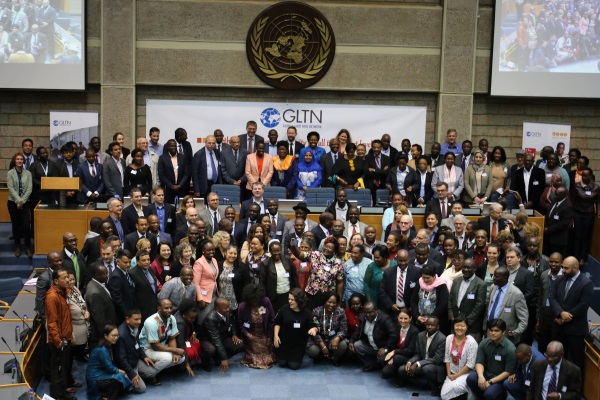
The participants at the Partners meeting in Nairobi
The partners meeting focused on the finalisation and evaluation of phase
2 and discussions on the strategy of the upcoming phase 3 that will run
from 2019-2030. Where the first GTLN phase 1 2006-2011 focused on the
development of land tools, phase 2 concentrated on the usage of the
tools at a country level. Still further tools were developed and
existing tools refined.
In phase 3, the network will focus on the further development of
priority land tools and approaches, as well as their implementation to
support national and local governments, in conjunction with civil
society organizations, the private sector, local communities and other
land actors to deliver on the international commitments and obligations,
(VGGTs, NUA, SDGs) towards sustainable land governance and improved
tenure security for all, with a focus on women, youth and vulnerable
groups in both urban and rural settings. The first part of Phase 3 will
be 2019-2023.
The UN Habitat Excutive Director sent a message to the partners meeting
via a video. She emphasised that the work of the GLTN Partners is
impressive, with a real domino effect influencing positive changes in
the lives of urban poor. Land is central to UN Habitat’s mandate in
order to achieve sustainable development and to fight inequality. When
inclusively managed, land can be used to fight poverty, reduce conflict,
establish food security and prevent unplanned urbanization and land and
tenure security is critical to the delivery of the SGDs and NUA. Land is
where development starts.
The evaluation of phase 2 showed an effective and efficient network that
has managed to create results. During the partners meeting there were
presentations of country key achievements and lessons from: Nepal,
Philippines, Uganda, Kenya, Democratic Republic of Congo, Zambia, the
Sudan and Iraq.
FIG Vice President participated in a panel discussion that addressed
land tenure security issues for achieving sustainable development: new
paradigm. She pointed out that "brilliant ideas do not come from silos";
GLTN is a diverse network and it is important that the partners have a
deeper understanding of each other. The results need to be carried out
both within the, now larger, network, and to a wider audience.
|
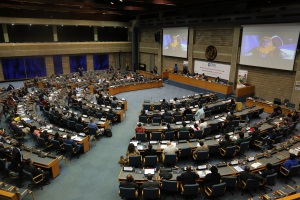
At the opening |
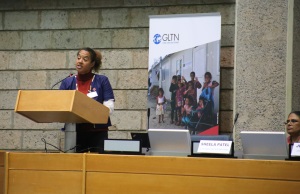
Diane Dumashie
presenting at a session on new paradigm |
The country implementation sessions included, apart from presentations,
a poster session in which all participants were invited to discuss with
representatives from all the different projects.
|
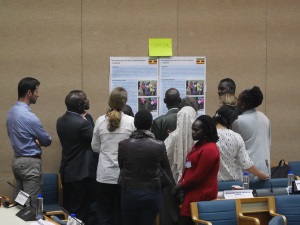
Discussion of
country implementation - Uganda
|
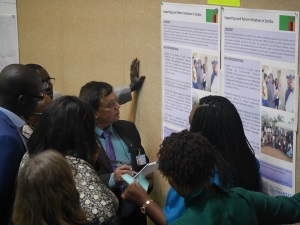
Country implementation - Zambia
|
The last part of the meeting concentrated on the finalisation of the
strategic framework for 2019-2030. The strategy continues the country
focus and also a refinement of tools as well as finalisation of the
tools that are still being developed. It is essential for GLTN to move
from a grassroot level to get anchored at a government and ministry
level. The communication of the importance of land and the connection to
the SDG's also has a special focus.
FIG involvement and results
FIG has been involved in the development of many of the tools that are
now being used at a country level. During the last year, among other
things, FIG has worked with the following areas:
At the partners meeting the Guide for Valuation of Unregistered
land was launched. The work on the guide was started all the
way back in 2010. FIG has held two expert group meetings to discuss the
content and development of the guide and the theme of unregistered lands
has been part of the technical programme each year at FIG Working Weeks
and Congresses. The guide was launched at a dinner, and Louise
Friis-Hansen remarked: ‘Valuation of Unregistered Lands : A Policy
Guide’ is based on internationally recognized GLTN’s continuum of land
rights framework and aims to significantly contribute to our
collaborative journey of securing land and property rights for all.
Valuation of unregistered lands will strengthen the
implementation of global frameworks like the Sustainable Development
Goals, the New Urban Agenda, the Voluntary Guidelines on Responsible
Governance of Tenure of Land, Fisheries and Forests (VGGT) and the
continuum of land rights approach. Transparency in valuation decisions,
reduced public expenditure, reduced land disputes; land market
development and reduced corruption are other positive impacts that will
accrue from the implementation of the policy guide.
Read more about the guide
Voluntary Community Surveyor Programme (VCSP) is a
programme that has been driven by FIG Young Surveyors. 13 Young
Surveyors from Senegal, Nigeria, Nepal, New Zealand, Uganda, Denmark,
Namibia, Philippines and Zimbabwe have successfully been working on GLTN
Projects for 2–4 weeks in DR Congo, Kenya, Nepal, Uganda, Philippines
and Zambia. The VCSP leverages on the skills, experience, talents and
education of young surveyors, and matches this competence with the needs
of GLTN, particularly in GLTN’s country level implementation plans and
programs.
The Fit-for-Purpose approach to land administration
offers a practical solution to provide security of tenure for all and to
enable effective management of land use and natural resources. It
provides a new, innovative and pragmatic solution to land administration
focused on developing countries, where current land administration
solutions are not effective or not delivering at scale. FIG Africa
Regional Network conveined a workshop/learning exchange n Rwanda on the
Fit-for-Purpose approach. It is important for FIG to promote the FFP
concept and engagements among land professionals. The participants
concluded that the FFP approach provides trust in government through
providing security of tenure, builds the future of land professionals –
especially in developing countries and serves people by building a
sustainable future.
Read more
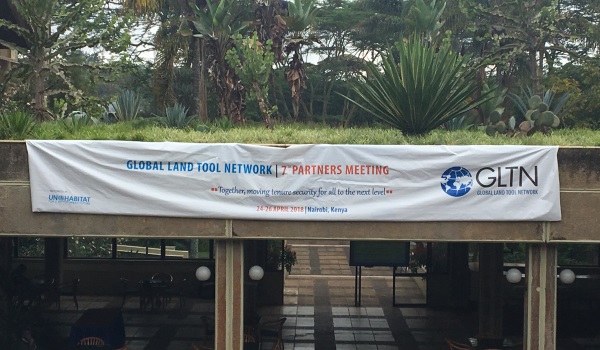
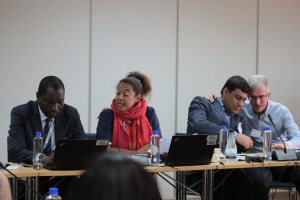
Diane Dumashie
in discussion with Oumar Sylla, GLTN |
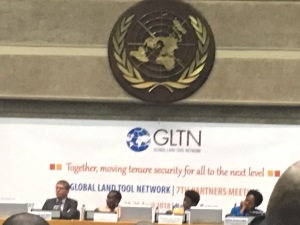
At the opening |
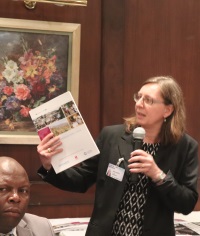
At the launch of the Guide on Valuation of Unregistered Lands |
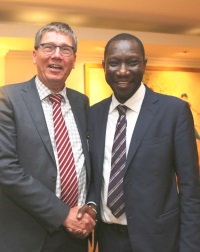
Frits van der Wal, Netherlands with Oumar Sylla, GLTN. The government of the
Netherlands has been one of the larger donors and contributers
for the GLTN Phase 2 implementation. |
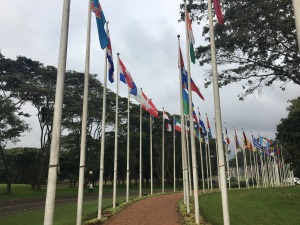
At the UN-Habitat in Nairobi, Kenya |
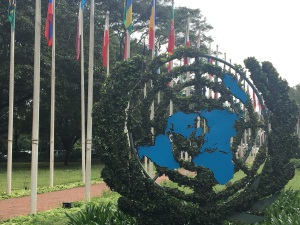
Welcome to the GLTN partners meeting |
Louise Friis-Hansen
10 July 2018



































